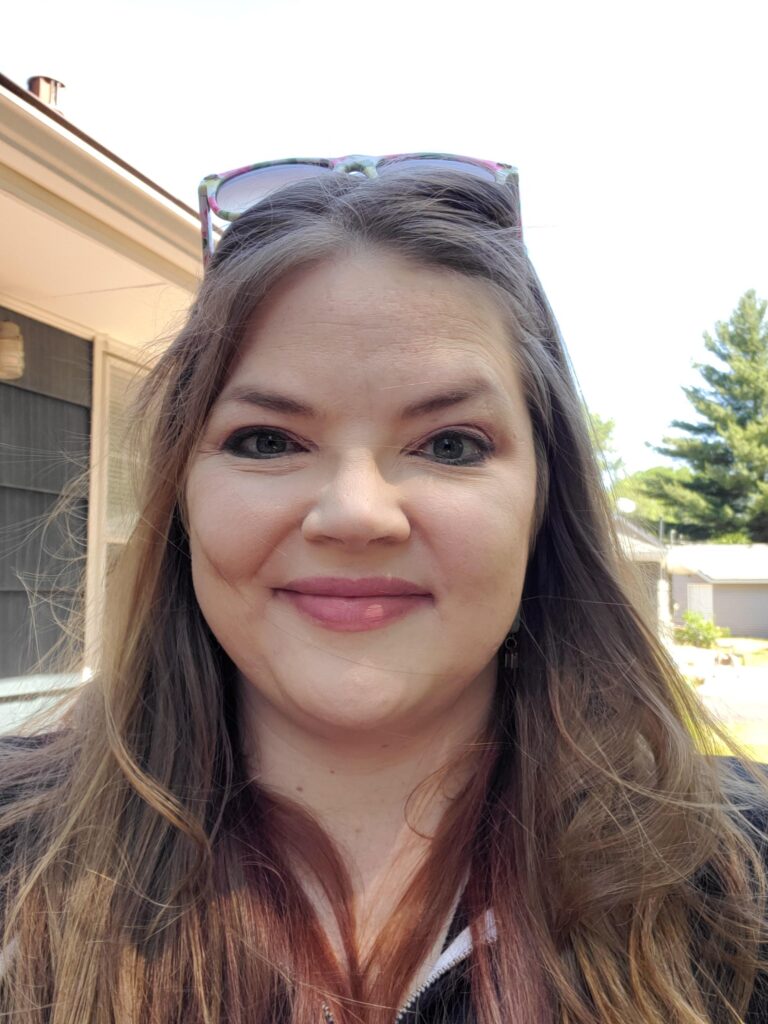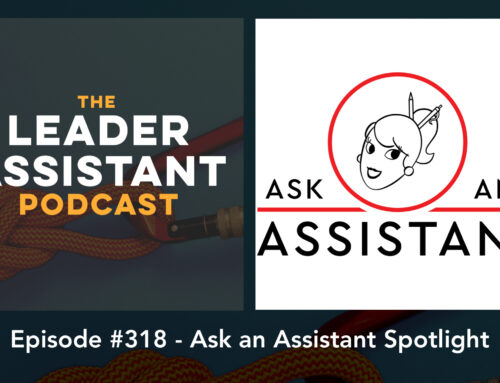Jen Johnsen has been part of Children’s Theatre Company as an Executive Assistant since 2013, managing the Artistic and Managing Directors.
In this episode, Jen talks about creating structure in your role, professional etiquette, and adapting quickly to changes at work.
LEADERSHIP QUOTE
To say you have no choice is a failure of imagination.
– Jean-Luc Picard
CONNECT WITH JEN
ABOUT JEN
Jen Johnsen has been part of Children’s Theatre Company as an Executive Assistant since 2013, managing the Artistic and Managing Directors. Prior to that, she worked many freelance positions for non-profit organizations and theaters. Her two favorites were as Production Manager for Sample Night Live! and as a Fortune Teller for A Touch of Magic. Jen holds a Bachelor of Science from Minnesota State University, Mankato in Theatre Performance and Directing. While not at work, you can find Jen on a nature hike, watching Star Trek, or painting. Jen lives in Bloomington, MN with her husband, Brian, son, Franklin, and two cats, Bruce and French Fry.
–––
THE LEADER ASSISTANT PODCAST IS PRESENTED BY EZCATER
ezCater is the nation’s most trusted provider of corporate food solutions — the best way for companies to order food for daily employee lunches, meetings, and events of any size or budget. ezCater’s simple-to-use platform provides a network of over 100,000 restaurants nationwide, business-grade reliability, food spend management tools, and 24/7 support from their highly trained customer service team.
To explore corporate food solutions or place a catering order, visit ezcater.com.
–––
THE LEADER ASSISTANT PREMIUM MEMBERSHIP
To learn more about how you can join growth-minded Leader Assistants, check out our Leader Assistant Premium Membership for ongoing training, coaching, and community.
THE LEADER ASSISTANT BOOK
Download the first 3 chapters of The Leader Assistant: Four Pillars of Game-Changing Assistant for FREE here or buy it on Amazon and listen to the audiobook on Audible. Also, check out the companion study guide, The Leader Assistant Workbook, to dig deeper.
LEADER ASSISTANT LIVE EVENTS
Check out our constantly updated schedule of events for admins and assistants at LeaderAssistantLive.com.
JOIN THE FREE COMMUNITY
Join the Leader Assistant Global Community for bonus content, job opportunities, and to network with other assistants who are committed to becoming leaders!
SUBSCRIBE
Subscribe to The Leader Assistant Podcast so you don’t miss new episodes!
You can find the show on Apple Podcasts, Spotify, Google Podcasts, Pandora, and Stitcher.
Join my email list here if you want to get an email when a new episode goes live.
LEAVE A REVIEW
If you’re enjoying the podcast, please take 2 minutes to rate and review the show on Apple Podcasts here. Each review helps me stay motivated to keep the show going!
—
EPISODE TRANSCRIPT
Jen Johnsen 0:00
Hello, I am Jen Johnson and I’m the executive assistant at the Children’s Theatre Company. And today’s quote is from Admiral Jean-Luc Picardd. To say you have no choice is a failure of imagination.
Podcast Intro 0:21
The Leader Assistant Podcast exists to encourage and challenge assistants to become confident game changing leader assistants.
Jeremy Burrows 0:35
With so much on your plate, wouldn’t it be nice if ordering food for the office were easy and reliable. My friends at ezCater our workplace catering pros helping you find food for everything from daily employee meals to staff meetings and special events. With ezCaterer’s network of over 100,000 restaurants nationwide, you’ll have a huge variety of options near you for any group size, dietary need or budget. Your food arrives on time as ordered all supported 24/7 by ezCater’s team of experts. Visit ezCater.com/leaderassistant to find out more. Hey friends, welcome to The Leader Assistant Podcast. It’s your host Jeremy Burrows and today I’m very excited to be speaking with Jen Johnson. Jen is the executive assistant at Children’s Theatre Company. And I’m very very thrilled to jump into some exciting topics. But first just so you know, you can check out the show notes for this episode at leaderassistant.com/226 Leaderassistant.com/226. Jen, welcome to the show. What part of the world are you in?
Jen Johnsen 1:48
I am in Bloomington, Minnesota and I’m looking out at my sort of pie shaped backyard to a lovely cool evening. And it’s not too buggy yet. And there’s you know still some squirrels and birds chirping and stuff. So we have a nice little area in Bloomington.
Jeremy Burrows 2:10
Awesome Are you from there’s no snow,
Jen Johnsen 2:11
the snow is gone.
Jeremy Burrows 2:15
Are you from there?
Jen Johnsen 2:16
I am from autonom Minnesota, which is about 45 minutes south directly south of the cities.
Jeremy Burrows 2:24
Okay. Awesome. And then you have hobbies or pets or kids or all the above.
Jen Johnsen 2:32
I have a little bit of the all of the above. i My son has just turned seven. And he’s amazing. His name is Franklin. My husband is His name is Brian and we are in his office right now. I know we talked about this earlier but I have all the Lego in his in the office which we are all very proud of because we’re a Lego family. So there’s a hobby and then Big Star Trek fan we have in fact I’m kind of part of a trivia group here in the Twin Cities it’s called TC trek trivia that meets the second Wednesday of every month at driftwood char bar run by my buddy Taylor Cisco so I post I’ve done some panels to it various convergence I guess my hobbies are nerd and and in the day job is as a as an assistant.
Jeremy Burrows 3:23
Great. Well, when did you dive into the world of administrative professional executive assistants and when and why?
Jen Johnsen 3:34
I dove in somewhere around 2013. So when everybody in their brother was looking for a job between 2008 and 2012 ish, so was I and one of the prior to working at the Children’s Theatre, I was a palm reader for a company and entertainment company. So we would do like after prom parties. I was the production manager of a local show called Sample Night Live. So sort of a showrunner and making sure all the things were booked and worked and people got to where they needed to go and people were paid and all that. Let’s see, I was a standardized patient at the University of Minnesota where it was a fake patient for doctors and training. That’s interesting. It was it was a really cool job. And it’s actually really, really insightful to the medical profession because you think oh the doctor, they know. They know things. There must be good with people why else would they become a doctor? And that they’re just like everybody else because I got a bunch of inappropriate responses to things and just various and also like things where I was like, Okay, I think normally this would be obvious to somebody, but please don’t do that, or you know this or why don’t you do this next time? Or this made me feel this way when you did that. So next time, why don’t you try this? You know, because we could give them either live feedback or feedback through survey. But yes, yeah, this guy was like checking checking for lymph nodes and was and was like, Okay, so I’m going to touch here, and I’m gonna touch here. And then you can also check into your armpits. But don’t worry, I’m not going to like touch your breasts or anything. And I’m like, I already trusted you not to do the thing. And when you say the thing you’re not going to do. That’s, that’s don’t do that. So yeah, so I did that. And it was, it was actually a really, really fun job because you got to because you got to play these, this role. I’m trained as an actor. And I also worked at a comic book shop. And then I did spend six years doing administrative work as a sort of in a not in a call center for an insurance company. So sort of done the corporate thing. And I didn’t care for it. So then I sort of took a palate cleanser job as a in the comic book shop, and then did just tons of gig work. I was a marketing assistant and all kinds of stuff. development assistant and another theater or the history theater for had second. Yeah. What haven’t I done? Actually, is a great question.
Jeremy Burrows 6:46
So how long have you been in the in your current role?
Jen Johnsen 6:49
And my current role? 10 years?
Jeremy Burrows 6:51
Oh, nice. Congratulations.
Jen Johnsen 6:53
Thank you.
Jeremy Burrows 6:55
And so you said you’re trained as an actor. So what? Your work at a theater company? I do, how often do you get to, you know, participate or hop on stage or anything like that?
Jen Johnsen 7:11
Well, we are, I don’t really get to do that part. That’s for the actors. We’re an equity house, we’re one of the largest regional, we’re, I think, are the largest regional theater in the United States. And we’re are focused on multigenerational audiences. So our operating budget is somewhere north of 10 million. And so we we have you know, equity actors, and they’re paid or paid a wage, and it’s a it’s a real, it’s a real business. And that’s one of the things I kind of like to talk about with people because they don’t realize like, no, no, no, you can actually, like, do that for a living, not only act, but, um, work in arts administration, too. And there’s just a huge variety of things that you can do as an arts administrator, like working in marketing, digital marketing, what I do is, as an executive assistant is just making sure the artistic manager, I’m sorry, artistic director, and managing director, know where they’re going, that their calendar is clean, that they have their talking points that the board is taking care of, you know, things like that. So there’s just, and I’m not even scratching the surface, there’s a huge spectrum of things that are available to people within the within. And we’re a nonprofit to so we’re in that sort of 501 C three space. And so it’s just it’s a lot of things that people are gonna do with that, that skill set. But you know, people only think, Oh, if you’re an actor, you go on stage, right? Just as you did, which is not wrong. And that’s, that’s the thing, too. But it’s so much more than that. And I just like to tell people that because it’s not very well known.
Jeremy Burrows 8:54
Yeah, I just didn’t know if you had any, like opportunities to do any of the stage on stage in the spotlight stuff. Kind of like a hobby, you’re on the side or different
Jen Johnsen 9:04
dealers a hobby on the side. I did work as an actor in the 20s a little bit while working a day job and stuff. But once I got this job, it was it was just very busy kept me very busy. And you know, it was a it was one gig, which was the best part. You know, I get home at night. No, like, wait, I could just watch TV. And like snuggle with my husband and go back to the gig. Yeah. And go back to the gig the next day. Yeah.
Jeremy Burrows 9:39
Wow. So okay, so let’s talk a little bit about a couple things. You know, I’ve talked about this with on past episodes, but when I have people on the show, I typically will, you know, ask ahead of time for some topics that yeah, As your, you know, have experience in or are interested in or passionate about, and so on. And so you picked some good topics for sure. And even a couple of different ones that I don’t know that we’ve talked about on the show before. So I’m excited to good. And so one of them is professional etiquette. So I thought this was kind of an interesting one, because and I think this is why I thought it was interesting, because I don’t think I’d have anybody mentioned this before, more bring this topic up. So yeah, yeah. What do you want to discuss about it? What was your experience getting into the professional world? And sure, any, any tips there?
Jen Johnsen 10:39
I think it’s not always obvious how to. I mean, there’s a professional decorum, you know, I’m showing up here, and I’m not gonna, like, only tell you fart jokes, right? Because, you know, we don’t have that level of rapport yet. But, you know, it, unless somebody has that sort of emotional intelligence, and that sort of sense of their audience. It’s not always obvious how to present yourself in email in the world, to a board member to donors, so that does take some skill and some learning and some hard learning the hard way moments. And so I just think it’s, it’s an important thing to point out that, you know, we we are, you know, as yourself, you know, I hate to use the term wearing many hats, but you are, you’re doing so many different things. And you can’t necessarily let your guard down completely and be like, What do you want, you know, I’m busy, like, you can’t, can’t do that, you always have to put on a certain you know, almost like customer service aspect. Like I am a firm believer, everyone should have some kind of a service job because it teaches you a lot and but it can be very rewarding and so much of my career after my first job at a Dairy Queen, so much of my career has stemmed from, from those customer service experiences and teachings that you just have to learn on the fly. You just have to learn by peopling, you know,
Jeremy Burrows 12:32
you have to smile even when they’re being rude. And you have to, okay, sorry, I’ll take care of it, even though you want to slap them.
Jen Johnsen 12:40
Well, there is that and there’s, and depending on who you’re with, there’s boundary setting, right? There’s polite boundary setting. So which, you know, are terms that we didn’t really have in the 90s? Or there probably were but as a 15 year old, I had none. I didn’t have that. But But yeah, the the Smiling through it. The I think you were rude to me, but I’m going to talk about it with my boss later. You know, things like that. I think are important. Yeah.
Jeremy Burrows 13:11
Yeah, it’s kind of knowing your your context and knowing your audience and they’re all
Jen Johnsen 13:19
reading the room to to a certain extent like it that one, that one’s a hard one sometimes for me, because my my impulse is to try to work the room as if I have, you know, as if I were a stand up comic or something. So I want to get a laugh. I want to make sure everybody’s comfortable. And part of that is like breaking the ice. Right? And that’s not always a thing to do.
Jeremy Burrows 13:42
No, yeah, that makes sense. That said, though, I’m sure that those skills come in handy and are appropriate in certain settings. And
Jen Johnsen 13:51
normally, it’s,
Jeremy Burrows 13:52
it’s okay to turn that switch on sometimes.
Jen Johnsen 13:55
I have some improv training, and that improv training comes in real handy too, sometimes, because sometimes you just have to scrap everything you’ve been working on for three weeks and then just go with a new thing that you thought of four seconds ago and make that decision and run. Yeah,
Jeremy Burrows 14:12
definitely. Okay, great. Well, what another topic was building structure in like systems and processes. Setting up that structure in your role. Can you tell us a little bit about that and why you were excited to chat about that? Yeah,
Jen Johnsen 14:31
I came into the role that I’m currently in with I think two page, double sided, I think packet of here’s what you do. Now. It’s like, okay, cool. The My predecessor had been gone, I think for six weeks at that point, and they had a temp in place. The Temp was lovely and I remember being so struck by me, she was giving me a tour, she was kind of telling me this and that. And she was like this right here, this is where you make the coffee for the board meetings. And here’s where the cups are, here’s where the coffee grounds are. And here’s this and here’s, I’m like, cool. Who’s the board? Like, that’s an important thing to know. So there was, so that story leads into, there was a lot of structure that I came into. And so it was a lot of like, figuring it out and finding things and through sort of piecing together, how I can do things and making very conscious decisions on, okay, everything has a place, everything must be put back in its place. Okay, I have this file structure. Okay, I’m going to make it this because that makes things easy to find it in terms of file structure, and I thought everything was dated, appropriately in its fiscal year, like, cool, I’m going to keep that. And, um, and that all evolved into a sense of doing my future self a favor, making sure that if I’m going to put a process in place, I make a mental note of it, I write that process down. And it feels a little bit like overkill, but at the same time, there’s so much going on, that it’s always a good idea, like I use OneNote a lot. So I’ll go back to my OneNote. And I’ll, which I’m doing right now, I’m going through my sort of annual to do list. And my annual to do list is reads like a technical manual. And today I, you know, did all the things that it said on there, because I couldn’t remember it. And I was like, oh, yeah, that’s a thing I got to do cool, because I might a year ago, pass Gen wrote that down so that future Gen could look like she knows what she’s doing. And it’s just, it’s just adhering to those things, honoring yourself, by adhering to those things so that you can keep doing a good job. And sticking to that, that foundation, even in the midst of like everything coming at you all at once. Because everything comes at you all at once.
Jeremy Burrows 17:24
Right? Yeah, I think it’s, you know, it’s like, a lot of times, assistants and even executives, they will think to themselves, and we will we will think to Earth ourselves, it’s gonna take too much time, or it’s too much work to, to document this process, or it’s too much time to too much of a headache to try to write it down, I’m just going to do it. And the reality is, like you mentioned, when we document it, and when we, when we write it down, it saves us time later on, and it saves. Even our brain is not as tired and drain. And that cognitive load is not as heavy, because we’ve documented things and put it in a system in a process. So that we don’t have to hold everything in our executive assistant mind.
Jen Johnsen 18:20
Right? Well, and, and to me, this was a, this was a great exercise. When I went on maternity leave, I had to document the top 10 most important things for my interim person to keep track of and wrote everything down. You know, made it so that they just had to keep the status quo, you know, and just kind of adjust as as they went along. Give them as much time because I was like two weeks late in delivering so I had time to sit with them and go okay, this is this and okay, this this person, you know, do this and screen the calls, because sometimes we get, you know, calls that they don’t need to deal with. So you take that and you say yes, yes. Yes, I will. And I’ll take care of that and write that number down and you know, actually delegate it to where it should go to you know, um, so kind of got to walk them through that bit. And then and then I had to call him one day, it’s like, okay, it’s go time I’m no longer there. But I left them this huge bite on that a huge binder but like a very well color coded binder with them so that they could they could walk through the whole thing. My managing director too, was only like two months old. They’re the time because they’ve just been hired we’re just kind of getting to know each other and then I had to go so um so it was kind of a it was a it was a wacky time. When I took the 12 weeks and the best part too, when I came back from maternity leave, because I had done so much work kind of building that structure and writing the structure down, just I mean, just to support the point you just made too. I done all that work, I came back, the my interim person had kind of given me the lowdown on what was what was happening. I was like, Cool. We thank them very much. We had a little goodbye party, and that it was just me by myself, in my office with my, all my tools, all my tools were there. But suddenly, my hammer had a button. And I was all stressed out, like what is why is my hammer have a button, I don’t get it. And I was able to go back to the book I had made. And just kind of take my time remember in my head a little like, cardinal rules list for the interim person that was actually a bomb to myself when I was rereading it because it was things like, be kind to yourself, things like when you know better you do better you learn and you move on things like that, and just really revolved around like, breathe. And go. So yeah, in that, those sorts of things. And especially like I’m the only person at the my organization who is in my role. There are other support positions and coordinator positions and such, but I’m the only one who like intensely handles the calendar and plays like scheduling Tetris every day and and sort of coordinates travel at that height that well, there’s another person that coordinates travel at a pretty high level, but but I’m sort of a unicorn in the company, because I’m the only one that does what I do. And so it’s, it’s a little bit lonely at times, but also like, so. So because it’s kind of a lonely, or rather singular position. I have to do those things for myself in order to kind of keep everything aligned and keep my own sanity. And yeah,
Jeremy Burrows 22:14
yeah, cuz you don’t, it’s not like you have a team of 10 assistants that are kind of, Oh, I’ll take care of this while you’re out. And I’ll take care of this. You can kind of share that burden. So totally, I can totally relate. I’m the only assistant in my role in my organization as well. So
Jen Johnsen 22:29
yeah, there’s some stuff we can delegate and there’s certain like, like, overall building processes that we have which which are great. Especially coming back from COVID. We’re not fully back to sort of a pre COVID staffing yet and so we’re still I mean, we’re mostly figured out but it’s it’s been a long road.
Jeremy Burrows 22:53
Yeah. What about adapting quickly? Have you had to adapt in your role
Jen Johnsen 23:05
all every day?
It’s it’s sort of a there was a movie from like the late 80s. called Don’t tell mom the babysitter’s dead with Christina Applegate. Thank you for knowing that. Where she fakes her way into becoming this fashion designer assistant, and has this other gal do all this, like, report work for her and all this stuff. But her main thing is like, I’m right on top of that rose. And, and then she just figures it out. So this sort of adapting quickly is just like, like we kind of do every day we you know, you’re right in the middle of, you know, editing the board minutes that you took the night before, and they’re all messy and you have like 1000 misspellings, and you have to sit and go through it. And you’re totally focused on that. And then somebody swoops in and was like, Okay, I need a call with these producers right now, can you jump on that? And like, you have to switch your brain and oh, yeah, and you go off and you adapt, and you take care of that task. And you have to go back to the minutes later. Or you suddenly have to put the meeting that’s in 20 minutes and a completely new location. And communicate that to everybody and tell the delivery person actually go to this door because these reasons and send out an email to every saying actually, we’re going to be in the, you know, this location. And you have to run and set up the tables really quick too. So it’s just it’s just saying okay, Go. And watch. That’s one of the things that as an as with, with my experience in being an actor and also in improv, great run with it. If you that’s what you need cool and you know, and so there’s not a ton of time to really, to really think about it than like, Okay, this is what we need go. Right? So it’s just being able to have that really, that that plasticity of skill to just just take the ball and run with it.
Jeremy Burrows 25:42
Nice. Well, what’s been your favorite part about being an executive assistant?
Jen Johnsen 25:52
I think it’s been it’s, it’s such a great role, because of the role that I’m in is such a great mix of so many things I love the people they work with. There’s, like, I know where all my nerves are in the in the building, and I get to see everybody in the building, I get to take care of two really passionate and wonderful leaders who, who have who, who bring their joy and bring their determination every day, to the to their roles, and you can you can’t help but let that sort of also fuel you by proxy. My so, so my, my favorite is more specific to the, to the place that I’m at, because it’s, I remember being so struck when I when I first got there, because we had we do a victor, please forgive me, Victor to thank our music director because he puts on this cabaret, that’s just for the staff. So I don’t know if that’s a big secret to anybody. But it’s a wonderful time where we put on a show for ourselves where like staff, get to get to sing a song, tap dance, show off whatever performative skill they have. They have a visual art show, I usually run the bar, and we all just kind of get together have a potluck and, and entertain each other with our talents. And the first one, I got to go to one of the one of the dearest people in the building, his name’s Tony white. He, he’s he’s Ojibwe. And he got up and he gave everybody this this he’s spoken. He’s spoken Ojibwe, and just kind of gave up a think of blessing to the whole organization. And I remember just like fighting tears, like where else do you find this? And we have this other tradition called the canoe. So again, Tony and Peter brush is our artistic director they got together years ago, I’m not going to do the story justice, but they But Peter wanted to make something that honored employees and but not like an employee of the month or something like that. So he’s talking to Tony about and Tony is also very fine artists and just just all around great guy. And so he he made a canoe. It’s about about a foot and a half long and it’s beautifully crafted, there’s sage and lemongrass kind of on the inside of it. And we’ve made it a tradition to pass the canoe to someone who the canoe is never is never completed its journey until it’s been through every person in the building. And so it’s been on this journey, I think for like 20 years. And I and it’s been one of the most beautiful parts of I think our culture at CTC and I, I just love it. And I was honored with it actually by my by the Managing Director, my my boss commodes, I think just before No the September before COVID And I got a standing ovation from my colleagues and it was one of the most magical moments like turn cry rich because because because the mission at Children’s Theater is for the kids. We inspire empathy we want the official mission is to educate, challenge and inspire young people and In their families, that’s our official mission. But like, it’s so embedded in every level of the building to, to, to create a pathway for empathy. Not only in the kids, but in the adults in the community in every body in the building. And it’s, it’s such a great mission for us to be on. And for, you know, it’s I found so much joy and so much purpose in that, and I think that’s my favorite part, but, like, specific.
Jeremy Burrows 30:39
No, that’s, that’s totally fine. I mean, I think that’s awesome. And, you know, it’s, it’s pretty rare for an assistant to find a role that they enjoy, like, you know, you enjoy being executive assistant, that’s one thing. Well, you can be an executive assistant anywhere, any industry, nonprofit, for profit, public, private, you know, there’s all kinds of industries and organizations, big and small, where you can be an assistant but it’s, it’s, it’s more unique and harder to find a role that is at a company or an organization or nonprofit that has the mission that you’re passionate about, as well, and the values and passionate about as well. And so I think that’s amazing. And that’s great that you’re in a sweet spot there, where you really are passionate about the same thing that the organization is passionate about. And I think that’s great.
Jen Johnsen 31:35
Yeah, it’s a it’s a bomb for sure. Because, yeah, I mean, on on days, where you’re like, Okay, let me type this next email. I’m like, Oh, God, then you’re going cross eyed. Like, actually, we’re doing this for the kids. We got it. We gotta make better to make better people by showing them these stories and giving them their agency and, and, and all that. I do still. I mean, I do feel like a rock star, though. When I do the simplest thing, seemingly the simplest thing, at least for me and people like that was what like they’re just blown away by the fact that I restarted the same thing again, or, or just hit Ctrl Alt Delete. The thing rebooted itself.
Jeremy Burrows 32:25
That’s awesome. Cool. Well, thanks again, Jen for sharing a little bit of your story and journey. And you know, next time, I’m in Minnesota, I’ll have to check out the Children’s Theatre Company sounds like
Jen Johnsen 32:40
an American tale running right now based on
Jeremy Burrows 32:43
Oh, nice, classic. Well, what, uh, you know, is there a place that people can reach out and say hi, if they want to connect with you?
Jen Johnsen 32:53
Sure. I’m on LinkedIn. I’m on the book face. And you can find me on the who’s who section of the Children’s Theatre website.
Jeremy Burrows 33:03
Great. Well, I’ll put your LinkedIn in the show notes leaderassistant.com/226 leaderassistant.com/226. And Jen, thanks again for everything and taking time out of your day to speak with us. And best of luck to you.
Jen Johnsen 33:20
Thanks, you too. Take care.
Unknown Speaker 33:32
Please review on Apple podcasts.
Unknown Speaker 33:41
Goburrows.com









